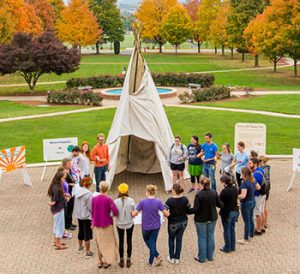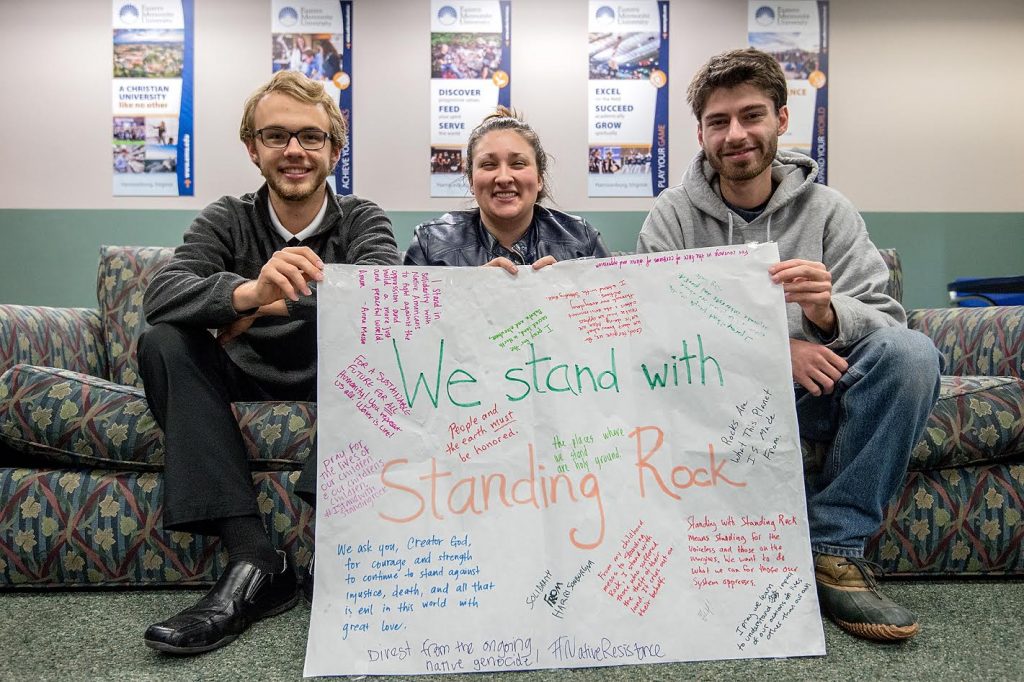Austin Sachs, 19, a sophomore at Eastern Mennonite University, couldn’t sit by idly watching the protests erupting at the Standing Rock Indian Reservation in North Dakota against the Dakota Access Pipeline.
“I was just getting fed up with what was happening there and that no one here was talking about it,” Sachs said during an interview on Nov. 29. “Harrisonburg was doing a little stuff, but it wasn’t enough.”
The 1,172-mile pipeline would have stretched diagonally down from the Dakotas, through Iowa to Illinois, transporting hundreds of thousands of domestically-produced crude oil every day. The project faces backlash from the Sioux tribes at the reservation, which the pipeline would have run through. Fear spread that the pipeline would destroy sacred Native American graves and historical sites. Environmentalists are also concerned about the potentially disastrous effects if the pipeline burst, as well as its contribution to climate change.
Future of pipeline unknown

Resistance to the pipeline started in the spring, with thousands of protesters flocking to the protest camps by the summer. Sachs assembled a small group of EMU students who were planning to go to Standing Rock after finals on Dec. 16 to assist the camps.
However, those plans were brought to a halt when the U.S. Army Corps of Engineers denied the final easement needed for the pipeline Dec. 4, which will temporarily block construction of the pipeline. Energy Transfer Partners, the company tasked with constructing the pipeline, will now have to reroute the pipeline, according to the Associated Press.
Energy Transfer Partners released a statement calling the Army Corps’ decision to deny the easement a “purely political action,” and accused the Obama administration of purposely delaying the process until his end of term. The victory for pipeline opponents, Sachs said, means the protests will likely die down for now.
However, some protesters have vowed to remain on site, the AP reported. Sachs said his group’s trip will probably be canceled, but as of Dec. 5, they would wait until the end of the week to make a final decision.
“This is because Dakota Access and Sunoco Logistics [their parent company] have made it clear they are not planning on following the Army Corps orders and plan to still drill under Lake Oahe,” Sachs stated in an email. “Within the next few days, we will see what the complete follow-out is from the Corps decision and will likely vote soon.”
The pipeline threatens the drinking water of 18 million people, according to Sachs, if it bursts under Lake Oahe or the Missouri River. The group wants to send the message to cease investments in fossil fuel infrastructure.
“We need to stop investing in what’s going to destroy this planet eventually and start investing in how we can save this planet,” he said in an earlier interview.
EMU student activism
Sachs learned of the troubles at Standing Rock some 1,600 miles away through Jill Stein, who ran on the Green Party ticket in the U.S. presidential election and has been an activist at the Indian reservation. The accounting and economics major added that he has made sure to read about the issue from all points of view.
Sachs and his fellow students organized prayer vigils for Standing Rock every Thursday. The first three were in Thomas Plaza, located centrally on campus in teepees that drew some attention. The group circulated a petition and a public statement that received 269 signatures. They also passed around fliers with information about what’s happening in North Dakota.
The group presented a proposed resolution to the Harrisonburg City Council to show solidarity with Standing Rock. The group of eight planned to stay at Standing Rock for five days. The students received partial funding for the trip through EMU’s Student Government Association.
Other groups of people in the Valley have made the trip to Standing Rock, including students from James Madison University. Sachs was concerned about the students’ safety with potential arrests. While the EMU students were going to serve the camps, and did not plan on being involved in the direct protesting, hundreds of protesters have been arrested at Standing Rock.
“If you’re going to the camps, you’re risk-free as they’ve stated … but the second you do direct action, all that risk all the sudden shows up. It doesn’t matter what you’re doing, there’s a chance you could get arrested,” he said. “[We were] leaving that up to their choice to make sure there’s no risk and that they don’t feel like they could possibly be arrested. … We want[ed] everyone to go and support without feeling they’re risking their safety.”
Mennonite mission
The American Indian Religious Freedom Act of 1987 provides the protection of Native American religious rights and cultural practices.
Sachs wants to make sure that law is upheld. “The native people are connected to the land and to drill into the land and run a pipeline is very offensive. It’s not just about water, it’s about respecting their native rights,” he said. “Since European colonists descended upon this country, we have just pushed and killed and terrorized Native Americans, and it’s time we start standing up for them instead of standing against them.”
Elizabeth Witmer, 20, a social work major at EMU, said advocating for Standing Rock is in line with the mission of EMU and the Mennonite Church. “One of the phrases that we very commonly quote is, ‘To do justice, love mercy and walk humbly with God,’ so when we have that phrase as part of our mission statement, it kind of seems like we can’t just stand by and let something like this happen when so many people are being treated horrifically because they’re trying to stand up for their rights,” Witmer said.
Harrison Horst, 20, a sociology major and one of the leaders of Earthkeepers, the largest student environmental organization on campus, said it is important for them as college students to participate in a cross-cultural experience.
“We spend so much time, effort, energy and money to send people far away to do cross-culturals when we can honestly do cross-culturals here in the United States because there’s a lot we don’t understand about the different cultures in the United States, and one example of this is the Native American population,” Horst said.
Sachs said the main goal of his group is to learn, serve and share what they learn about the Native Americans’ plight with the Harrisonburg community.
“The only way to really learn about these cultures is to immerse yourself and be open to learn about them. If we are going to stand up for them we need to understand where they’re coming from,” he said. “In college, we can be in a bubble of just ourselves and our problems. It leads us to not care about others, which we think is important for humans to care about others as brothers and sisters.”
The next steps
The students held one last prayer vigil of the semester on Thursday to celebrate the denial of the easement and to pray for the future of the project. The group plans to stay involved any way they can.
“At this point, it is hard to say how we will continue being involved. First and foremost, we will continue our prayer vigils into next semester if it is still going on then,” Sachs stated. “The City Council resolution is still being proceeded upon as if nothing happened [Dec. 4]. And finally, we will continue to raise awareness of the issue in Standing Rock and how it relates back to us here in the Valley.”
Sachs said that while last Sunday’s news is encouraging, the fight is not over. “There is still cause of concern if it is eventually rerouted,” he said. “While it can be hoped that if it is forced to reroute, that the expenses will be too high and therefore the project will be canceled, but if it proceeds to be rerouted and actually built, it could still contaminate drinking water for millions. All a rerouting of the pipeline does is lower environmental and human rights concerns, but not eliminate them completely.”
Sachs hopes that if the pipeline is rerouted, it will be directed farther north, “where it will do less damage to the environment.” “It also shows that indigenous people’s rights are something we will have to listen to from here on out,” he added.
Re-printed with permission from the Saturday, Dec. 10, 2016, issue of the Daily New-Record.
